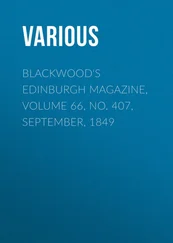Various - Blackwood's Edinburgh Magazine, Volume 56, Number 347, September, 1844
Здесь есть возможность читать онлайн «Various - Blackwood's Edinburgh Magazine, Volume 56, Number 347, September, 1844» — ознакомительный отрывок электронной книги совершенно бесплатно, а после прочтения отрывка купить полную версию. В некоторых случаях можно слушать аудио, скачать через торрент в формате fb2 и присутствует краткое содержание. Издательство: Иностранный паблик, Жанр: foreign_antique, periodic, foreign_edu, на английском языке. Описание произведения, (предисловие) а так же отзывы посетителей доступны на портале библиотеки ЛибКат.
- Название:Blackwood's Edinburgh Magazine, Volume 56, Number 347, September, 1844
- Автор:
- Издательство:Иностранный паблик
- Жанр:
- Год:неизвестен
- ISBN:нет данных
- Рейтинг книги:3 / 5. Голосов: 1
-
Избранное:Добавить в избранное
- Отзывы:
-
Ваша оценка:
- 60
- 1
- 2
- 3
- 4
- 5
Blackwood's Edinburgh Magazine, Volume 56, Number 347, September, 1844: краткое содержание, описание и аннотация
Предлагаем к чтению аннотацию, описание, краткое содержание или предисловие (зависит от того, что написал сам автор книги «Blackwood's Edinburgh Magazine, Volume 56, Number 347, September, 1844»). Если вы не нашли необходимую информацию о книге — напишите в комментариях, мы постараемся отыскать её.
Blackwood's Edinburgh Magazine, Volume 56, Number 347, September, 1844 — читать онлайн ознакомительный отрывок
Ниже представлен текст книги, разбитый по страницам. Система сохранения места последней прочитанной страницы, позволяет с удобством читать онлайн бесплатно книгу «Blackwood's Edinburgh Magazine, Volume 56, Number 347, September, 1844», без необходимости каждый раз заново искать на чём Вы остановились. Поставьте закладку, и сможете в любой момент перейти на страницу, на которой закончили чтение.
Интервал:
Закладка:
The next morning the deputation from the Chamber presented itself at the Palais Royal; and so far was resolved, that the Duke of Orleans was proclaimed lieutenant-general of the kingdom.
M. Louis Blanc gives several anecdotes respecting the King of the French, and his successive ministers, which we should be disposed to extract, but that his political antipathies lying exactly in this quarter, we have not felt sufficient confidence in their authority. For this reason we will pass on abruptly to a portion of the work where the political bias of the writer is harmless, or where it may have induced him to inform himself more accurately on his subject than the generality of persons.
This last is evidently the case in his account of the doctrines and practices of the St Simonians. One who felt no sympathy with any portion of their creed, would not have taken the trouble to obtain accurate information, or an intimate knowledge on this subject. Not that M. Blanc is a St Simonian; to do him justice, he has argued with ability and clearness against their leading tenets or maxims; but being a man devoted to a new order of things of some kind or other, he has given naturally a more than usual attention to this sect, and we think our readers will hold themselves obliged to us, if we abridge some portion of his account of St Simon and his disciples.
“The founder of the St Simonian school had been deceased five years when the revolution of July broke out. He belonged to one of the noblest houses of France, bearing the name and arms of that famous Duke de St Simon, the historian of the reign of Louis XIV., and the last of our veritable grands seigneurs . Yet it was the privilege of birth that he attacked, and the impiety of war that he proclaimed. He was a man of singular independence of mind, and of extreme moral courage. Convinced that, before dictating a code for the regulation of human life, it was necessary to have attentively analysed that life as it actually exists, he spent the first half of his days in studying society under all its aspects; recoiling from no experience, practising, in the character of an observer, even vice as well as virtue; drawing a lesson from his own frailties, and making a study of his own follies. He dissipated his fortune in premeditated prodigality, and terminated a studious opulence in excessive poverty; living on the miserable salary of a copyist, when in idea he was governing the world. In the estimation of some, a sage—of others, a madman; at one time sanguine to enthusiasm, at another discouraged to the point of attempting suicide; reduced at last to the condition of a mendicant, after having so often united round his table, in order to observe and judge them, the most celebrated men in art and literature. Such was St Simon in life and character: it remains to see what were the intellectual results he arrived at.”—(Vol. III. p. 96.)
His first project of a code for human life was sufficiently ridiculous. In a work entitled Letters from an Inhabitant of Geneva to his Contemporaries , he addressed himself to the learned portion of the world, inviting them to undertake the government of the human race. The programme was as follows. A subscription was to be opened before the tomb of Newton. Every one was called upon to subscribe according to his means, rich and poor, man and woman; and each subscriber was to have a voice in the selection of—three mathematicians, three natural philosophers, three chemists, three physiologists, three men of letters, three painters, and three musicians. These several threes, amounting to twenty-one, besides having the produce of the subscription, were to form a council, called the Council of Newton , and undertake the spiritual government of the world, directing the efforts of the several nations of the globe towards one common end.
The learned portion of the world made no response to this invitation; he therefore next addressed himself to the operatives, declaring that the time was come to tear the crown from the brow of idleness, and establish the reign of labour. The king was now to be the chief of artisans, his ministers enlightened workmen; and the electoral right was to be so placed as to transfer all power from the proprietor of the soil to the cultivator, from the capitalist to the journeyman. One would say that, piqued with the indifference of the most literate portion of mankind, he was determined to offer the government of the world to the most illiterate. Since the Royal Society would not accept the ball and sceptre which he had placed at its disposal, he gave them over to the Trades’ Union.
But neither would this satisfy him. He who appeals to the lowest order of minds must confine himself to what is intelligible to, and influential on the lowest; and this would hardly accord with one who, at all events, had led an intellectual life, of however wild an order. He again reverted to the thinking classes, and to some modification of his first idea; and his New Christianity —his last and most complete effort—has for its object to erect an intellectual and spiritual government of the world. Taking his analogy from the spiritual dominion of the church of Rome, but finding that that power was too restricted in its exercise, inasmuch as the material interests and scientific labours of mankind were not embraced by it, he called for the foundation of “a religious power, which, embracing humanity in all its interests, should conduct it towards a Christian purpose—the amelioration of the lot of the great multitude of mankind; by their sentiments employing artists , by their reason employing the learned , and by their activity employing the operative .”
Whatever may be the importance of this conception, it answered one purpose—it satisfied the builder’s mind. St Simon died full of faith and hope. When he bade his eternal adieus to the few disciples who surrounded his dying bed, he regarded his work as completed, his mission as fulfilled. “The fruit is ripe,” said he; “you will gather it.”
The disciples of St Simon still further elaborated and disseminated his doctrines; and a school was formed which recognised MM. Enfantin and Buzard for its chiefs. It need hardly be said, that the new order of society was to be founded on universal benevolence—no war, and no rivalry—and the industry of mankind organized in such sort, that to each man would be assigned according to his capacity, and to each capacity according to its works .
We quote with pleasure the remarks (tinctured though they are by his own peculiar opinions) which M. Blanc makes on this famous formula:—“In preaching a universal association of men, founded on benevolence—in demanding that industry should be regularly organized, and that she should establish her empire on the ruins of a system of violence and war, the St Simonians showed a thorough intelligence of the laws which will one day govern humanity. But they overthrow with one hand the edifice they erect with the other, when they announce this famous formula— To each according to his capacity; to each capacity according to its works —a formula wise and equitable in appearance, but in reality subversive and unjust.
“If we say that a man, in virtue of his intellectual superiority, is to adjudge to himself a larger share than others of the goods of this world, what right have we to censure the sturdy barbarian, who, in virtue of his physical superiority, was wont to take the lion’s share to himself? We have changed the basis on which the tyranny rested—the tyranny remains. The St Simonians, it is true, justify their formula on the grounds of public utility; it is well, say they, to stimulate talent by recompense. But is it necessary that the recompense of talent be of this gross and material kind? that it be counted down in so much wealth? Thank Heaven! man has other and more energetic motives. With a piece of riband to be attached to the buttonhole, Napoleon could make an army of a million of men rush forward upon danger and death. The word glory , well or ill understood, has always decided the destinies of the world. What is amply sufficient when the work of destruction is in hand, by what disastrous fatality does it become incompetent when the task is to produce and to create? Is it not true that great men have always sought and found their principal recompense in the very exercise of their high faculties? If society had wished to recompense Newton, it would have been utterly powerless to do so; there was for Newton, in all the world, no other or sufficient recompense, but the joy he must have felt when his genius discovered the laws which govern the planets. * * * The greater the intelligence, the greater the sphere of action; but not necessarily the greater the material recompense. The inequality of capacities can legitimately conduct to the inequality only of duties.”
Читать дальшеИнтервал:
Закладка:
Похожие книги на «Blackwood's Edinburgh Magazine, Volume 56, Number 347, September, 1844»
Представляем Вашему вниманию похожие книги на «Blackwood's Edinburgh Magazine, Volume 56, Number 347, September, 1844» списком для выбора. Мы отобрали схожую по названию и смыслу литературу в надежде предоставить читателям больше вариантов отыскать новые, интересные, ещё непрочитанные произведения.
Обсуждение, отзывы о книге «Blackwood's Edinburgh Magazine, Volume 56, Number 347, September, 1844» и просто собственные мнения читателей. Оставьте ваши комментарии, напишите, что Вы думаете о произведении, его смысле или главных героях. Укажите что конкретно понравилось, а что нет, и почему Вы так считаете.












